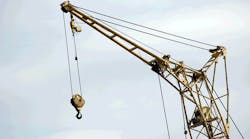The deaths of two workers in a crane tip-over on April 12 in Bourne, Mass. could have been prevented if their employer, Massachusetts Bay Electrical Corp., had set up and operated the crane according to the manufacturer's instructions and trained employees in its proper operation, according to findings from an OSHA inspection.
"These deaths were preventable," said Brenda Gordon, OSHA's area director for Boston and southeastern Massachusetts. "The employer did not refer to or use readily available and necessary information that would have allowed this work to be conducted safely. This lapse placed two workers in harm's way and needlessly cost them their lives."
The employees were working from a raised personnel platform attached to an Elliott 40142 truck-mounted crane. They were working on power lines on the mainland side of the Cape Cod Canal, when the crane overturned and fell more than 150 feet to the ground.
OSHA found that company employees were not properly trained or evaluated on the Elliott 40142 truck-mounted crane prior to use. Supervisors at the job site did not follow procedures for setting up and operating the crane in accordance with the crane's safety manual, even though the manual was in the crane and at the job site. They also did not conduct proper pre-lift planning and other required tests to ensure that the lift could be done safely.
These conditions resulted in OSHA citing Massachusetts Bay Electrical Corp. for two willful violations of workplace safety standards. A willful violation is one committed with intentional, knowing or voluntary disregard for the law's requirements, or with plain indifference to worker safety and health.
OSHA also cited the company for four serious violations, including not using load charts to determine the crane's minimum boom angle, not using an aerial lift, allowing the crane to operate at greater than 50 percent of the rated capacity for its configuration and for failing to conduct a trial lift of the personnel platform prior to use. A serious violation occurs when there is substantial probability that death or serious physical harm could result from a hazard about which the employer knew or should have known.
Massachusetts Bay Electrical Corp., which faces $168,000 in fines, has 15 business days from receipt of its citations and penalties to comply, request an informal conference with Gordon or contest the findings before the independent Occupational Safety & Health Review Commission.

